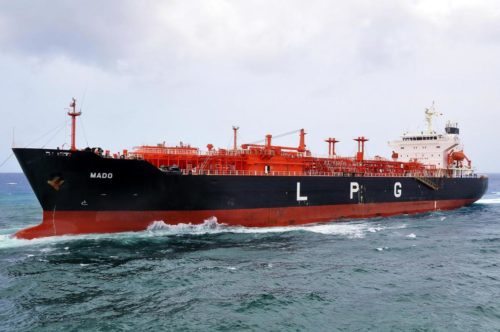
China bought nearly 3.6 million tonnes of U.S. LPG in 2017, making the United States the country’s second-largest supplier of the fuel used in petrochemicals, as well as for cooking, transport and heating.
U.S. imports have however come off dramatically over the course of 2018, before stalling completely in late August when China imposed an additional 25 percent tariff on over 300 U.S. goods, including LPG, in retaliation for U.S. tariffs.
Consultancy IHS Markit estimates U.S. imports fell to barely 1 million tonnes during the first eight months of 2018, down from about 2.1 million tonnes for the same period last year, said He Yanyu, Executive Director for Natural Gas Liquids.
The fall came as Chinese buyers wound back U.S. purchases of LPG amid
uncertainty about the impact of buying product from the United States, said a trader who tracks the fuel.
No U.S. LPG cargoes have landed in China since tariffs were imposed in late August, said Ong Han Wee at consultancy FGE.
“China has stopped shipping in U.S. LPG cargoes as they are now too expensive,” added a second trader who tracks LPG cargoes.
The United States last year accounted for about 20 percent of China’s total LPG imports, which are currently running at about $1 billion a month, based on Thomson Reuters calculation.
The U.S. gap is being filled largely by Qatar, the United Arab Emirates (UAE), Saudi Arabia and Kuwait, analysts said.
The change comes as prices for the fuel, often a mix of propane and butane, spike in line with higher oil prices.
State-owned Saudi Aramco, whose contract prices are used as benchmarks in Asia, fixed its propane and butane contract prices for October at $655 a tonne, the highest since 2014.
U.S. prices are also rising. The propane price at the Texan Mont Belvieu hub hit its highest since 2014 on Sept. 28 at around 108 cents per gallon before easing to around 104 cents on Oct. 9.
This works out to about $542 a tonne, based on Reuters calculations, but is above the Saudi Aramco price after taking into account freight and terminal charges and the additional 25 percent tariff.
China’s LPG imports rose about 15 percent to nearly 18.3 million tonnes in 2017, driven partly by new petrochemicals plants which use the propane dehydrogenation method to produce the raw material for plastics..
IHS’s He said LPG prices were likely to stay firm in November and December due to higher oil prices and winter demand.